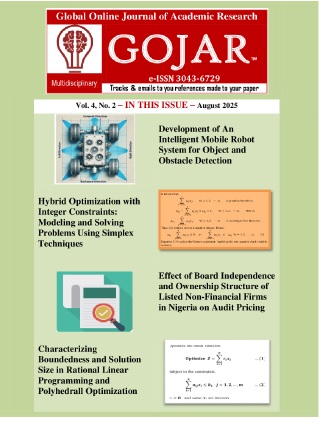Effect of Board Independence and Ownership Structure of Listed Non-Financial Firms in Nigeria on Audit Pricing
Keywords:
board independence, ownership structure, audit pricing, governanceAbstract
This study investigated the effect of board independence and ownership structure of audit pricing of listed non-financial firms in Nigeria. Two research questions and hypotheses were formulated in line with the objectives of this study. Anchored on Resource Dependency theory, the study used Ex-post facto research design. 77 listed non-financial firms in Nigeria were purposively selected as the population sample. The data used secondary data and were drawn from 2014 to 2023. The secondary data collected were analyzed using descriptive statistics, data normality test, correlation analysis and regression analysis. The results indicated that Board Independence has non-significant effect on audit pricing among listed non-financial firms on the Nigerian Exchange Group. This outcome also suggests that variations in the proportion of non-executive directors on the board do not have a meaningful influence on the audit fees paid by firms. The study also found that ownership structure proxied by institutional ownership has a significant positive effect on audit pricing among listed non-financial firms in Nigeria. This indicates that, holding other factors constant, a unit increase in institutional ownership will yield a statistically significant increase in the audit fees paid by firms. It was concluded that the positive association of factors like institutional ownership with audit fees suggests that certain governance structures can drive demand for more rigorous audits, reflecting the increased oversight expectations of stakeholders. The study therefore recommended that stakeholders should implement stronger internal control systems and corporate governance frameworks. Additionally, the use of the Least Squares Dummy Variable (LSDV) regression estimator enhances the robustness of the findings, as this method effectively controls for unobserved heterogeneity among firms, leading to more reliable results.

